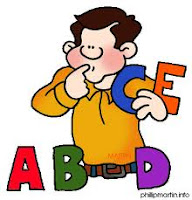How to Spell
How good is your spelling? If you struggled learning to read and write in English or if English isn't your first language, you know how difficult it is to spell.
Like its pronunciation, its spelling is inconsistent.
Here's a few examples, but these are only the tip of the iceberg:
All this is a long-winded way to introduce this humorous spelling lesson ably given in less than 2 minutes by a man of 102 years.
Like its pronunciation, its spelling is inconsistent.
Here's a few examples, but these are only the tip of the iceberg:
- There are some rules but these only work for some words, for example the 'i' before 'e' except after 'c' rule only applies to 11 words.
- Different sounds can be represented by the same letter or combination, for example 'ough' is pronounced at least 6 different ways, try 'cough', 'enough', 'nought', 'plough', borough', 'through'.
- Many English words are homophones i.e. some words sound the same but have different meanings differentiated by the spelling, e.g. 'tea'/'tee', 'gait'/'gate', 'made'/'made'.
- There are also many silent letters. For example: the 'k' is not pronounced in 'knee' or 'knight, the 'e' isn't pronounced in 'imagine'.
- The commonest letter in English is 'e' and appears in the most inconsistencies. It can be used to change the way a previous vowel is pronounced, as in 'car' or 'care', 'mad' or 'made'.
- Spelling and pronunciation of place names in the UK is a nightmare, even for those who have English as a first language. You have to learn each one individually, but if you ask the locals they may not agree - even between themselves.
- UK English spelling is often different from US English spelling.
All this is a long-winded way to introduce this humorous spelling lesson ably given in less than 2 minutes by a man of 102 years.
Thanks to Church Mag for posting the video clip and eChurch Blog for drawing my attention to it.

Comments
Post a Comment